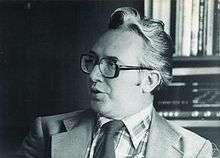Detlef Laugwitz
Detlef Laugwitz (1932–2000) was a German mathematician and historian, who worked in differential geometry, history of mathematics, functional analysis, and non-standard analysis.

Biography
He was born on 11 May 1932 in Breslau, Germany. Starting in 1949, he studied mathematics, physics, and philosophy at the Georg-August-University at Göttingen, where he received his doctorate in 1954.[1] Until 1956 he worked in the Mathematical Research Institute of Oberwolfach. In 1958 he became a lecturer at the Technical University of Munich, where he obtained his Habilitation. In 1958 he moved to the Technical University of Darmstadt, where in 1962 he became a professor, and remained until his retirement. From 1976 to 1984 he was a visiting professor at Caltech.
Work
Laugwitz worked in differential geometry of infinite dimensional vector spaces (his dissertation) and in Finsler geometry. In 1958 he and Curt Schmieden developed their own approach to infinitesimals through field extensions, independently of Abraham Robinson. They described this as "infinitesimal mathematics" and leading back to the historical roots in Leibniz. In 1996 he published the standard biography of Bernhard Riemann.
Notes
- Differential geometry without the axiom of dimension, Mathematische Zeitschrift Bd.61, 1954, p. 100
Publications
- Laugwitz, D. (1965). Differential and Riemannian Geometry (first ed.). New York: Academic Press New York.
- Laugwitz, D. (1989), "Definite values of infinite sums: aspects of the foundations of infinitesimal analysis around 1820", Archive for History of Exact Sciences, 39 (3): 195–245, doi:10.1007/BF00329867.